Bringing a new dog into your life is an exciting time filled with joy and anticipation. As you begin this journey, preparing for the first veterinary visit is crucial to ensure the long-term health and happiness of your pet. This initial trip to the veterinarian is not just about vaccinations and health checks; it’s also about establishing a relationship of trust and comfort for both you and your dog with the veterinary team.

To set the stage for a positive experience, gather all necessary paperwork and medical records before your visit. It is beneficial to have a list of questions or concerns to discuss with the vet. Also, consider the logistics of the trip; a safe and comfortable way to transport your pet is essential. Remember, the effort you put into the first vet visit can go a long way toward fostering a strong bond between your new companion and their healthcare provider.
Key Takeaways
- Establishing a trusting relationship with the vet during the first visit is beneficial for your dog’s long-term wellbeing.
- Preparing paperwork, questions, and safe transportation in advance helps create a positive vet visit experience.
- Your involvement and preparation can greatly influence your dog’s perception of veterinary care.
Essential Preparation for Your Dog’s First Veterinary Appointment
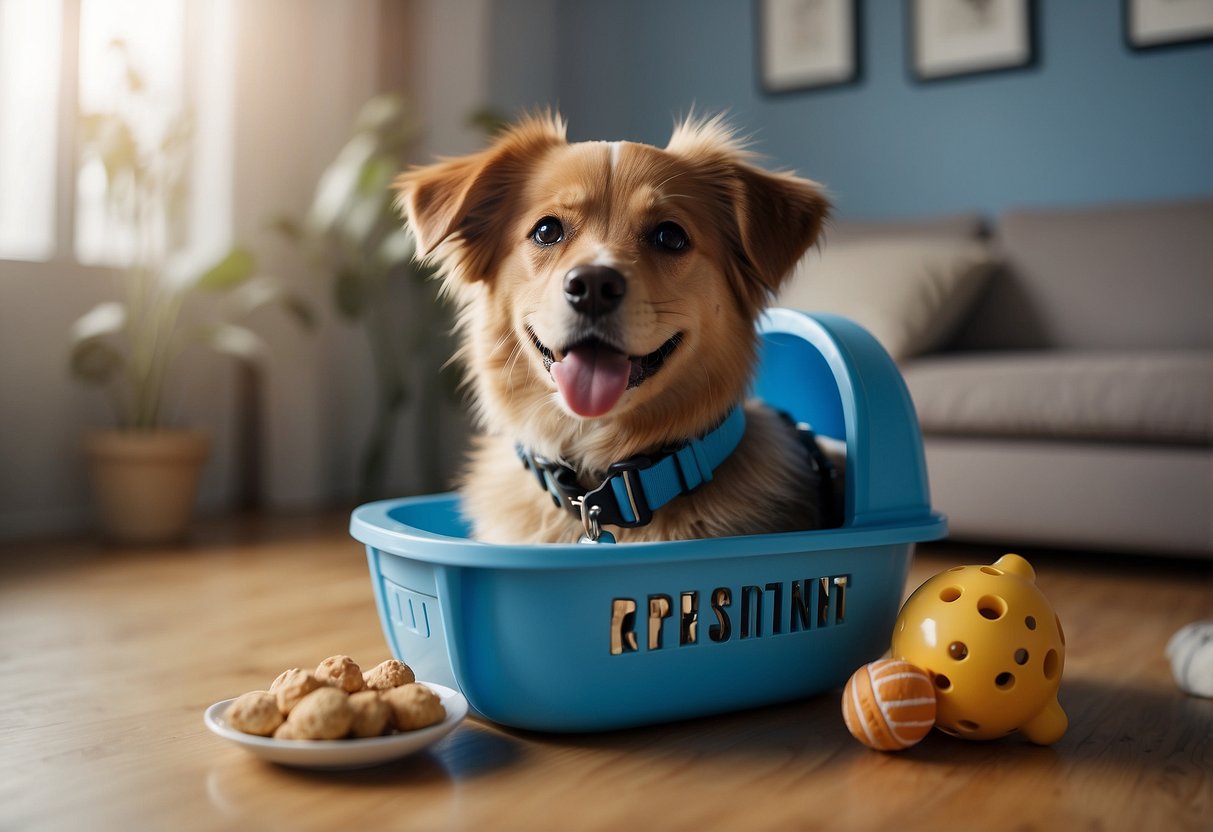
Taking your new dog to the vet is a vital step in ensuring their long-term health. There are crucial preparations to make, such as understanding the importance of this initial visit, gathering the necessary documents, and knowing how to schedule the appointment.
Importance of the First Visit
The first veterinary visit is much more than a simple meet-and-greet; it sets the foundation for your dog’s health. During this visit, the vet will assess your dog’s overall well-being, administer necessary vaccines to protect their immune system, and establish a baseline for detecting future health concerns. The vet will also create a vaccination schedule and discuss the best time for spaying or neutering if applicable, which are critical for preventing unwanted behaviors and health issues.
What Documents to Bring
When you’re preparing for the appointment, it’s essential to have all the necessary documents on hand:
- Medical records: Including any previous vaccination records or known health concerns.
- Adoption paperwork: If you’ve adopted your dog, bring all associated documents.
- History: Be prepared to discuss your pet’s history, including any known allergies or past medical treatments.
Having this information helps the vet understand your dog’s past and tailor their care accordingly.
Scheduling the Appointment
Choosing the right time for your dog’s vet visit is important. Here are some steps to ensure the scheduling process goes smoothly:
- Check your calendar for a date that works well for you, keeping in mind your availability and your dog’s routines.
- Contact the clinic to find out their availability and book a time that causes minimal disruption to your and your pet’s day.
- Mark the appointment on your calendar and set reminders as necessary to avoid missing it.
Starting your dog’s health care with a positive and thorough veterinary visit is critical. Consult resources like Marleys Mutts for guidance on setting up veterinary care for newly adopted dogs to ensure you’re well-prepared for a successful first appointment.
Knowing Your Veterinary Clinic
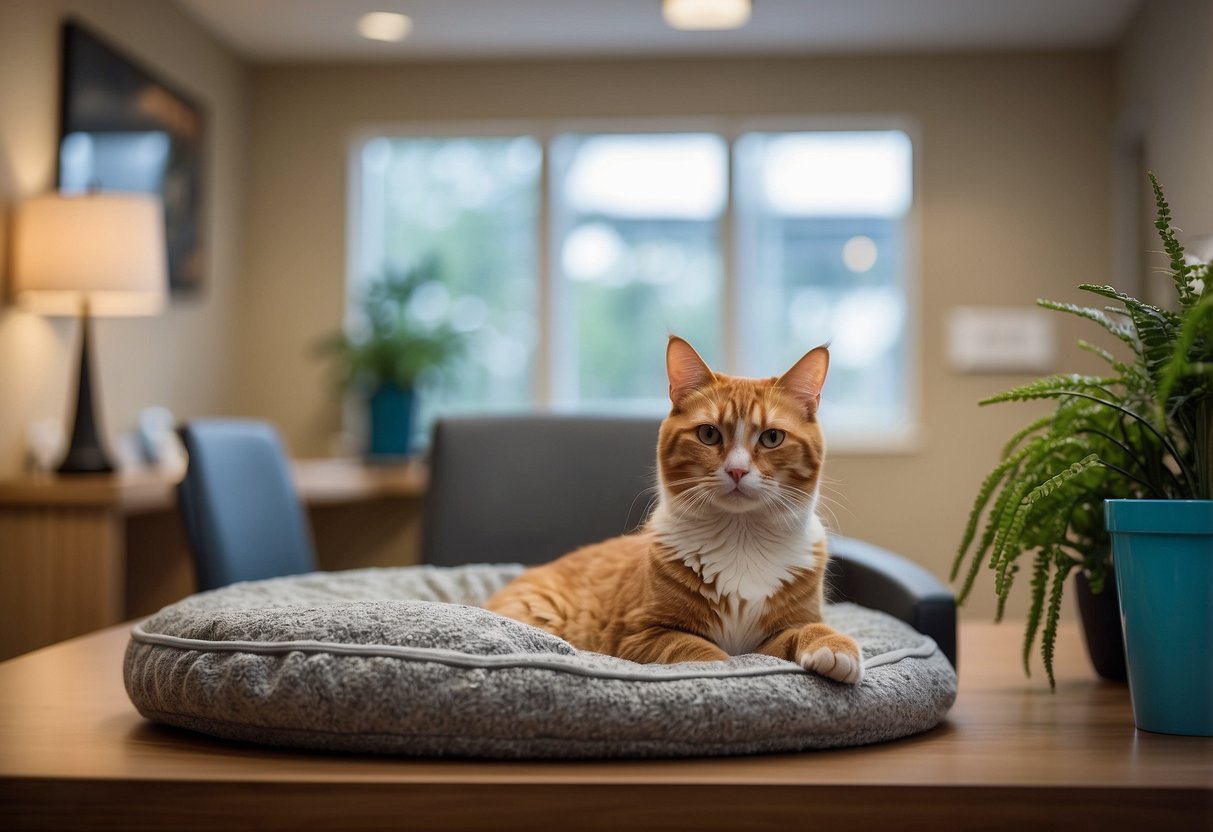
When you choose a clinic for your dog, it’s important to be aware of what services they can provide and to have an understanding of the people and place where you will be taking your dog for care.
Services Offered
The clinic offers a range of services to keep your dog healthy. At the core, they provide preventive care, which means they help stop sickness before it starts. This includes:
- Routine check-ups to catch any potential issues early.
- Essential vaccinations to prevent common diseases.
- Guidance on diet and nutrition to keep your pup in top shape.
- Recommendations for sufficient exercise to maintain your pet’s fitness.
- Procedures like spaying and neutering to help control the pet population and prevent certain health issues.
For times when your dog might need more help, the clinic has emergency care services to deal with urgent health problems.
Staff and Facility Overview
Your clinic is staffed by professional and caring people ready to support you and your pet:
- Veterinarians (Vets): The skilled doctors who diagnose and treat your dog.
- Veterinary Technicians: The vet technicians assist vets during examinations and treatments.
- Receptionists: These helpful team members manage appointments and are often the first to greet you.
The facility is equipped to make your visit smooth and stress-free, with clean exam rooms and spaces dedicated to the care of your pet. They work hard to provide a clean and safe environment for every vet visit.
What to Expect During the Visit
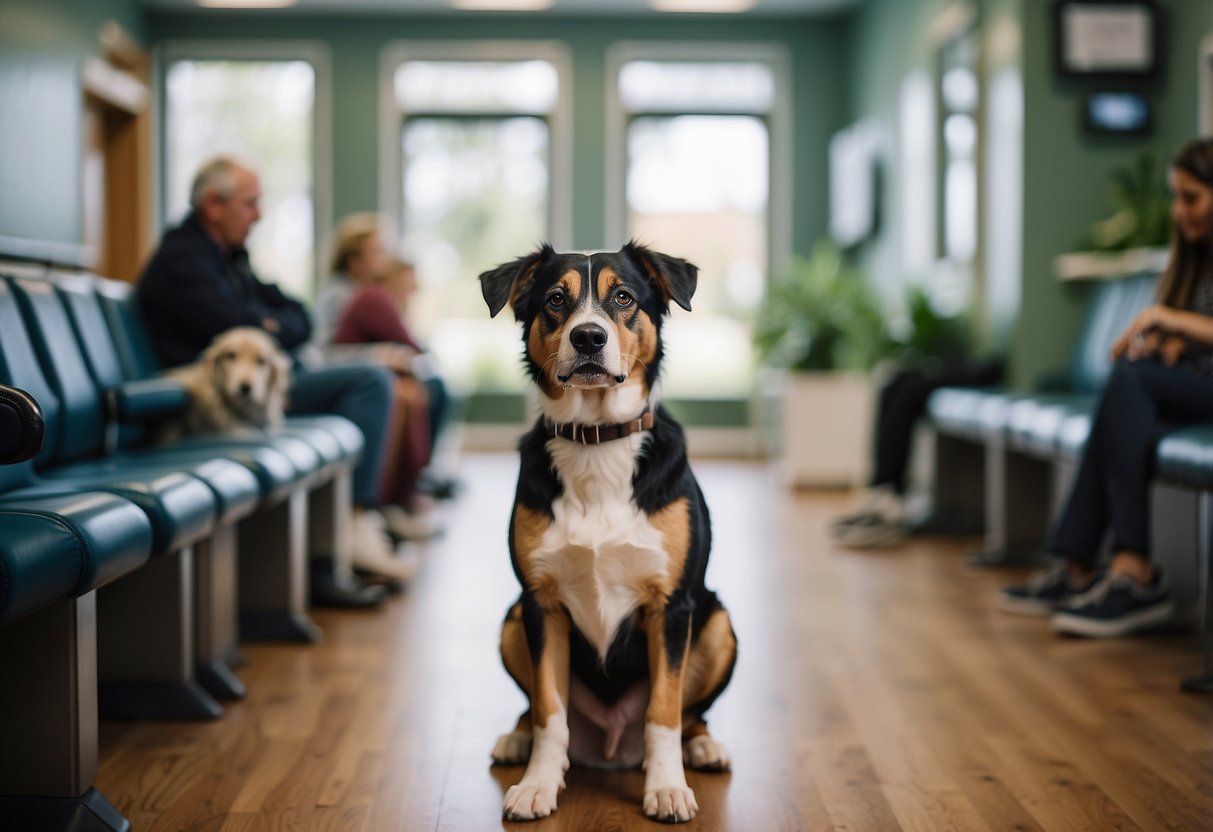
When you visit the vet for the first time with your new dog, you can expect a thorough physical examination, a discussion about necessary vaccinations and preventive care, and guidance on the decision to spay or neuter your pet. These steps are crucial for maintaining the long-term health and wellness of your dog.
Physical Examination
At the beginning of the vet visit, your veterinarian will conduct a complete physical exam of your dog. This process is not just about checking the overall health, but also about spotting any early signs of potential issues. Here’s what will be checked:
- Weight: Your dog’s weight will be recorded to ensure they are within a healthy range for their breed and age.
- Ears, Eyes, and Mouth: The vet will examine the ears for signs of infection, the eyes for clarity and any discharge, and the mouth for healthy teeth and gums.
- Coat and Skin: A close look at your dog’s coat and skin can reveal issues like allergies, infestations, or infections.
- Heart and Lungs: Using a stethoscope, the vet will listen to your dog’s heart and lungs for any abnormalities.
Keeping a periodic record of these checks helps the vet monitor your dog’s health over time.
Vaccinations and Preventive Care
Vaccinations are a vital part of your dog’s healthcare regimen. During your visit, the vet will recommend a vaccination schedule tailored to your dog’s specific needs.
Core Vaccines: These are essential for all dogs and protect against diseases such as parvovirus and rabies.
Non-core Vaccines: Depending on your dog’s lifestyle, additional vaccines may be suggested for diseases like Lyme disease.
Preventive care also includes protection against parasites:
- Heartworm Prevention: Critical for stopping heartworm disease, which can be fatal.
- Flea and Tick Prevention: Helps avoid issues like Lyme disease and discomfort caused by bites.
Discussion of Spaying/Neutering
Your vet will also discuss the benefits of spaying or neutering your dog. This surgery not only helps with population control but also offers health and behavior benefits.
- Health Benefits: Reduces the risk of certain cancers and other health issues.
- Behavioral Benefits: Can lead to a reduction in aggression and roaming tendencies.
Handling Anxiety and Stress
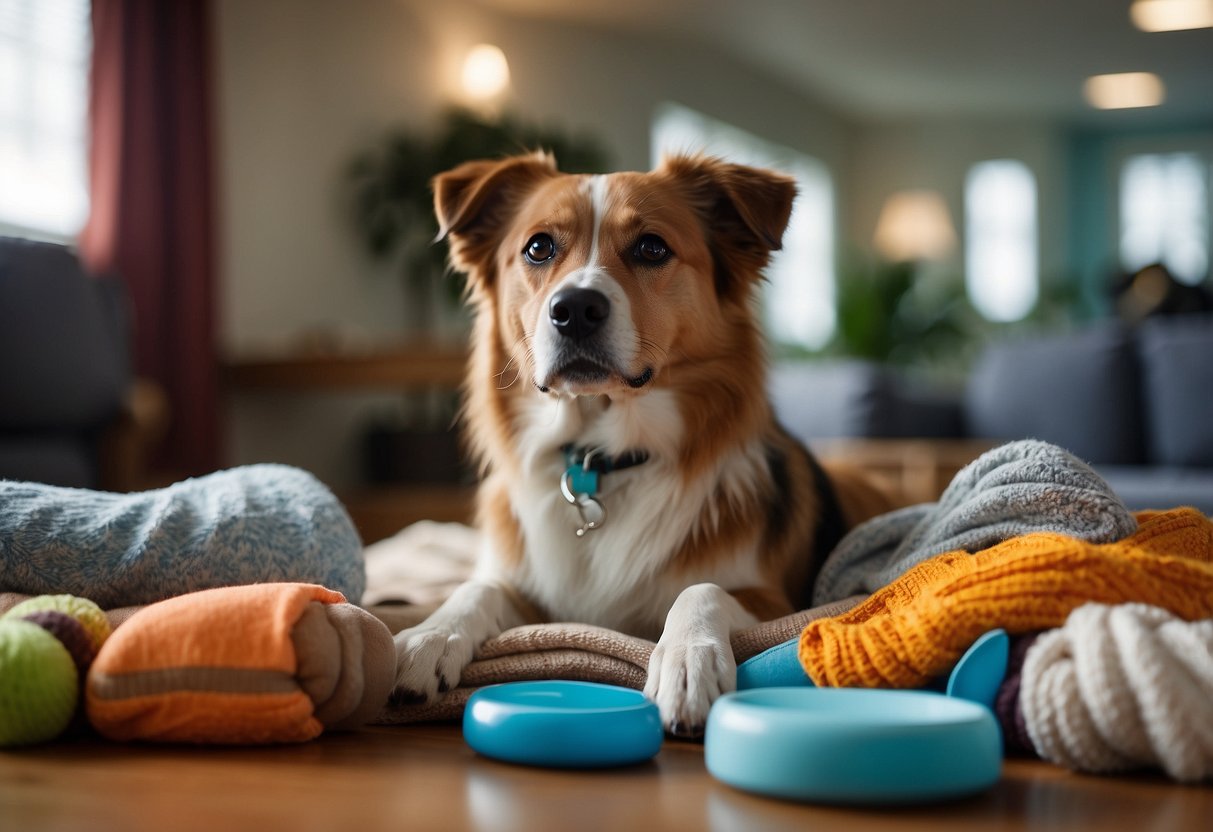
When preparing for your dog’s first vet visit, a little preparation can go a long way to ease both your puppy’s and your own nerves. Creating a calm experience and building trust can reduce stress for future visits.
Calming Your Dog
Before heading out to the vet, make sure your dog feels comfortable and secure. Start by getting your puppy used to the crate they will travel in. Include familiar items like their favorite blanket or a well-loved toy to provide comfort. Teach your dog that their crate is a safe place by spending time with them while they’re inside it and rewarding relaxed behavior with treats.
On the day of the vet visit, maintain a calm demeanor. Dogs can pick up on your emotions, so if you’re anxious, they might feel it too. Give lots of praise and treats for calm behavior. Sometimes, distraction methods work well to keep your dog’s mind off the unfamiliar environment. Simple commands and treats can keep their focus on you instead of the new surroundings.
Reducing Your Own Anxiety
Your attitude towards the vet visit can influence how your puppy will respond. It’s important to build a trust and relationship with your vet. This begins with feeling confident in your choice of veterinarian and knowing what to expect. Realize that vets are there to help and support the health of your puppy.
Before the appointment, write down any questions or concerns you have. This helps to ensure you don’t forget to address anything important during the visit. Remember that a positive veterinary experience relies not just on the staff, but also on your preparation and approach.
Keep in mind that regular vet visits are a crucial part of your dog’s health and comfort. Your emotional readiness can set the stage for a lifetime of stress-free check-ups. So take a deep breath, stay positive, and remember that you’re doing great for taking this step in your dog’s health journey.
Transporting Your Dog Safely

When it’s time to take your dog to the vet, ensuring their safety and comfort during transport is crucial. A little preparation can make the car ride a stress-free experience.
Choosing the Right Carrier
Selecting an appropriate carrier for your dog is vital for their safety and security. Your dog’s crate should be:
- Sturdy: It must withstand movement and keep your dog secure.
- Well-Ventilated: To ensure ample airflow and prevent overheating.
- Right-Sized: Your dog should be able to stand, turn around, and lie down comfortably.
- Securely Latched: The door must close firmly to prevent escapes.
A comfortable carrier also helps in reducing stress for your dog. Line the crate with a soft blanket or a towel from home to create a familiar environment. If your dog isn’t used to a crate, gradually acclimate them by having short practice sessions before the day of the visit.
Preparing the Car
Before setting out, ensure your vehicle is ready to transport your dog safely:
- Secure the Carrier: Place the crate on a flat surface in your car and use seat belts or other restraints to keep it from moving.
- Temperature Control: Adjust your vehicle’s temperature to keep your dog comfortable. Avoid extreme hot or cold conditions.
- Calm Environment: Soft music or a quiet setting can ease your dog’s nerves during the ride.
Remember, never leave your dog unattended in the vehicle, especially on warm days, as the temperature inside a car can quickly become dangerous.
The Importance of Follow-Up
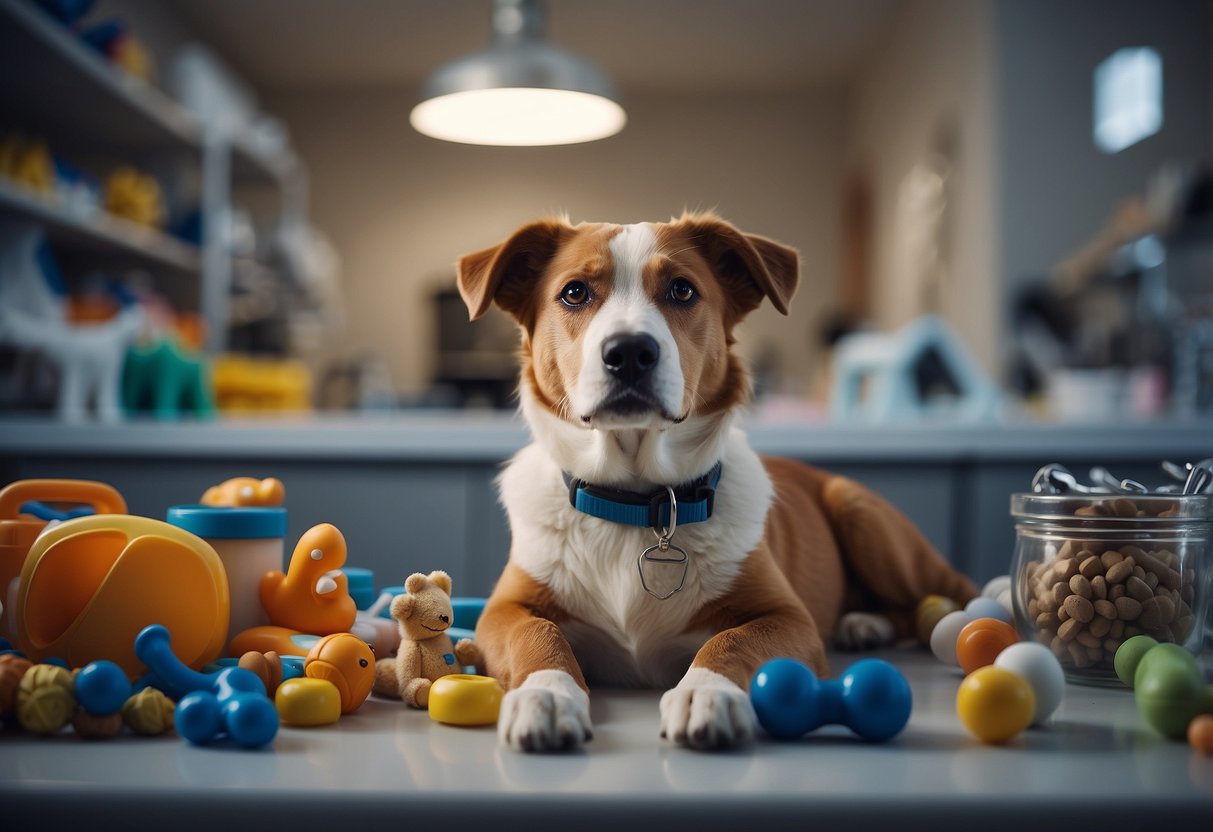
After your dog’s initial vet visit, it is crucial to keep on track with follow-up appointments. These ensure your pet’s health stays on the right path, taking into account any test results or treatments they may have received.
Planning Future Visits
Your veterinarian will recommend a schedule for future visits, which often depends on your dog’s age, breed, and health status. Follow-up visits may include:
- Vaccination updates: Essential for preventing serious diseases.
- Routine check-ups: These appointments help monitor your dog’s overall health. Make a note of the suggested dates for each visit.
You and your vet can plan these visits according to the tailored needs of your dog. It is important to adhere to the recommendations to maintain your dog’s health and prevent future health concerns.
Understanding Test Results
When your vet runs tests, they provide diagnostic information that is key to your dog’s health. Knowing what these results mean is an important part of your pet’s healthcare routine. Test outcomes might include:
- Blood work: Reveals health indicators such as organ function.
- Stool samples: Check for parasites and other issues.
- Urinalysis: Assesses kidney health and detects infections.
Ensure you understand these results and what they imply for your dog’s future veterinary care. Your vet will explain the significance of each test and answer any questions you have, so keep a copy of your pet’s medical records for reference. This information will help detect any changes in your dog’s condition in subsequent visits.
Final Thoughts
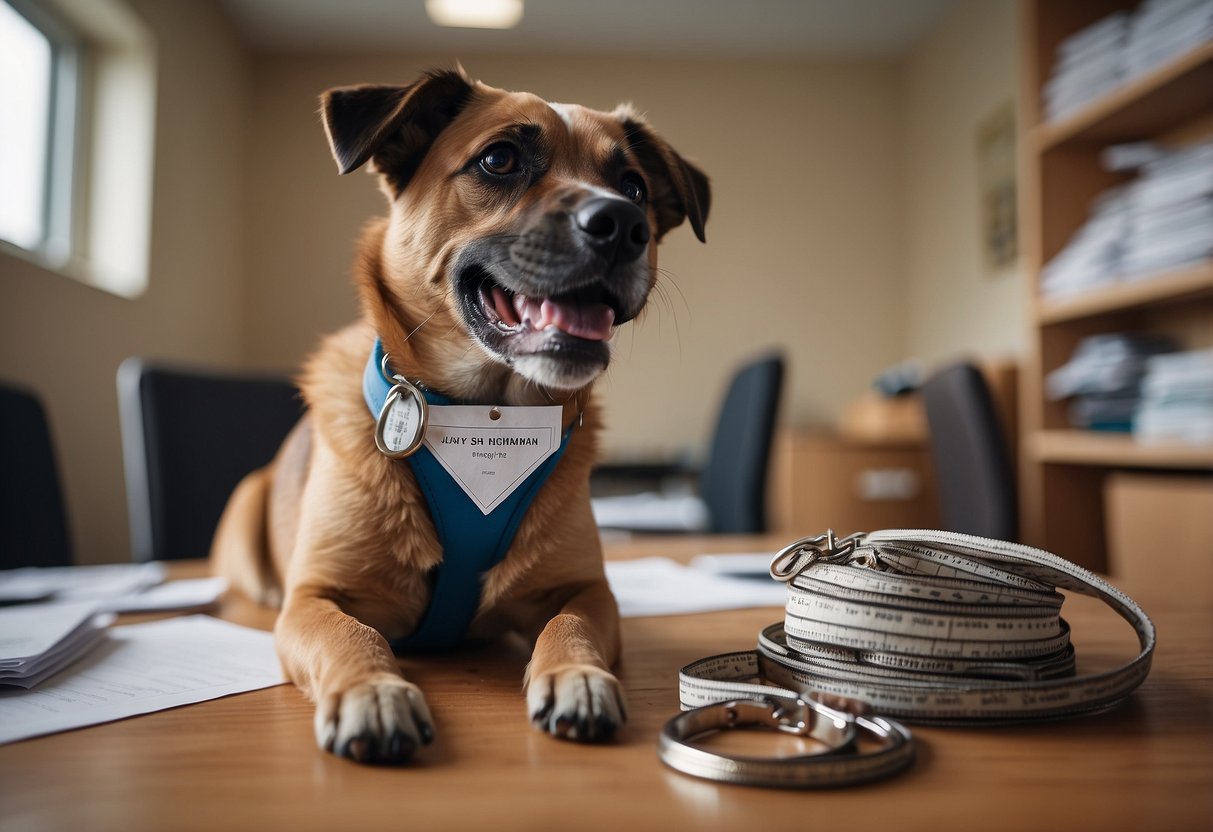
When you take your dog to the vet for the first time, remember it sets the stage for a lifetime of care. Being prepared can make a big difference. Your attitude has a powerful effect on your dog. Stay calm and show confidence; your dog will pick up on your cues.
Positive reinforcement is key. Bring treats and practice commands to create a distraction. This helps in forming positive associations with the vet, which can build trust. Your dog’s long-term health depends on regular check-ups. Good experiences at the vet strengthen the relationship you have with your pet and their healthcare provider.
Here are some important points to keep in mind for your visit:
- Stay Calm: You are your dog’s biggest role model.
- Positive Reinforcement: Treats and praise go a long way.
- Trust Building: A good vet visit can strengthen trust between you and your dog.
- Long-Term Health: Early and regular care promotes better health over your dog’s lifetime.
